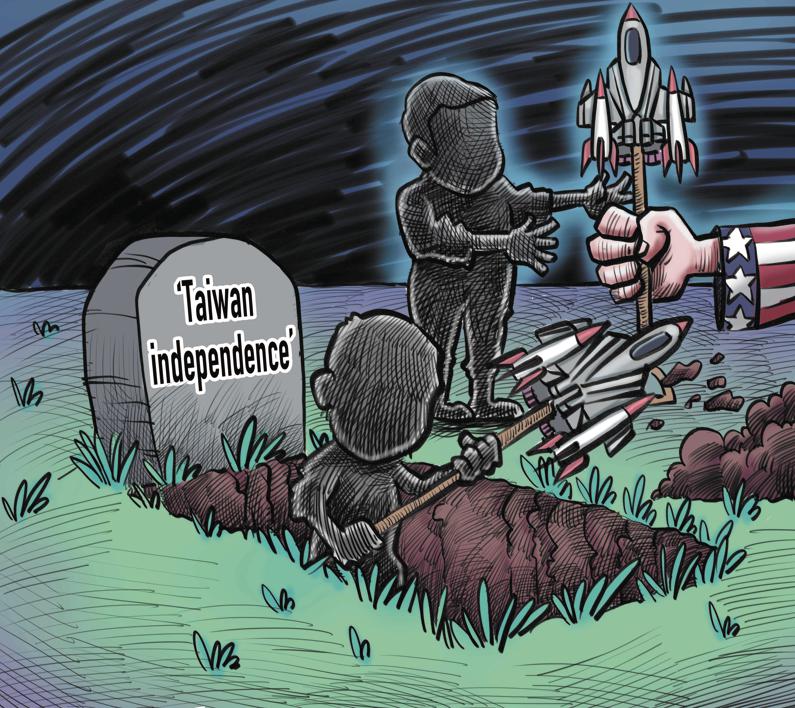Jasna Plevnik: 'Taiwan independence' extremely risky for US
- Details

Ilustration: JIN DING/CHINA DAILY
The US' actions suggest it is preparing Taiwan for a conflict on the pretext that the Chinese mainland appears ready to use force to reunify Taiwan with the motherland. The Western mainstream media for years have been setting imaginary deadlines for the mainland's offensive against the island, but all those deadlines have passed without any incidents. They have now extended the deadline to 2027.
The US ignores the simple logic that China cannot wage a war against itself, because launching an assault on the island would amount to exactly that. Also, the US deliberately ignores the fact that there is only one China and Taiwan is an integral part of China — and almost all countries in the world recognize this universal truth.
The US knows Beijing wants to achieve the peaceful reunification of Taiwan with the motherland but refuses to rule out the use of force to realize that goal given the attempts of separatist forces on the island to claim "Taiwan independence" with the not-so-tacit support of the US.
According to the Three Joint Communiques, which the US has signed and claims to adhere to, Taiwan is an inalienable part of China. In fact, for more than four decades since the establishment of Sino-US diplomatic relations, the US administrations acknowledged that Taiwan is part of China. Even the Joe Biden administration has been reiterating that Washington's relations with Beijing are based on the one-China principle.
Yet the US has been selling huge caches of weapons and military equipment to Taiwan in violation of the one-China principle, while supporting the separatist forces on the island. As a result, the separatist forces have intensified their pro-independence activities.
Washington claims it is committed to helping Taiwan "safeguard" its security under the"1979 Taiwan Relations Act" by, among other things, supplying it weapons. But by militarizing Taiwan, the US is going back on the commitments it made in the Three Joint Communiques and violating UN General Assembly Resolution 2758.
The US should not interfere in the Taiwan question because it is the internal affair of China. But, given its double-faced policy on the Taiwan question, the US seems hell-bent on undermining China's economic and technological development, in order to maintain its global hegemony. To weaken China on the technology front, the US has banned some Chinese telecom companies and Chinese-made apps, such as TikTok. It also wants to establish total dominance in the Asia-Pacific region by using the Chinese island of Taiwan as a pawn in its geopolitical game.
However, the US' failure to weaken Russia by instigating the conflict in Ukraine and continuously supplying weapons and military equipment to the latter has made the world realize the US is losing its superpower position — although there is no reason to assume it is in terminal decline and will stop using the Taiwan question to target Beijing.
But the US should not mistake Taiwan for Ukraine. While Ukraine is a sovereign country, Taiwan is an integral part of China. More importantly, Ukraine has realized, through its painful experience, how costly it is to be in the US' geostrategic orbit.
True, Taiwan island is known for its prosperity and as a global leader in manufacturing sophisticated semiconductors, but if the political elites and separatist forces on the island believe the US' default story on "Taiwan independence", they will only bring disaster to the island, for the US is nobody's friend.
Therefore, the Taiwan authorities should not allow the US to lead them by their nose toward disaster, especially because the US will use them as a pawn in its geopolitical games and abandon them as soon as it smells threat to its own interests.
More important, the island authorities should not overlook the fact that more and more countries are looking up to China to restore peace and stability in volatile regions.
Despite the US' provocative moves, China remains committed to promoting peace and development across regions, and improving international relations.
A healthy Sino-US relationship is critical to global economic and strategic stability. But while China is dedicated to promoting global harmony, the US is desperate to maintain its global hegemony. But despite Washington's evil design, a conflict among the two sides is not inevitable, because there are many convergence points for them to build a more balanced world.
The author is president of the Geoeconomic Forum, Croatia. The views don't necessarily reflect those of China Daily.
https://global.chinadaily.com.cn/a/202406/12/WS6668d947a31082fc043cbf37.html